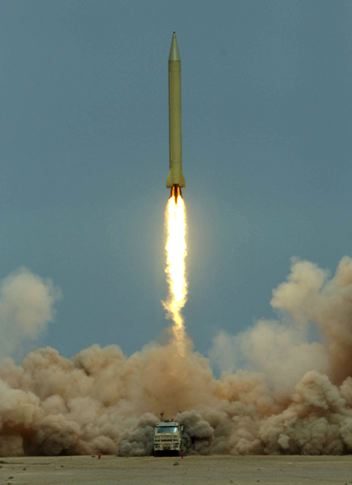
Najjar said that the Sajjil "will only land on the heads of those enemies … who want to make an aggression and invade the Islamic Republic."
President Mahmoud Ahmadinejad, in a speech given at a rally broadcast live on Iranian television, said boldly in language obviously designed to arouse passion in his listeners: "The Iranian nation defends its honor and whichever power that wants to stand against the movement of the Iranian nation, the Iranian nation will crush it under its foot and slap it on the mouth."
In Washington, U.S. State Department spokesman Robert Wood pointed to the new Iranian missile as further justification for U.S. plans to construct a missile shield in Europe. Wood said that U.S. officials hoped that Russia, which has been critical of the proposed shield, would now recognize the threat posed by Iran and realize that the missile shield is not designed to confront Russia.
"I think it’s pretty obvious when Iran launches one of these ballistic missiles, that this is something of concern to the international community, and I’m including Russia in the international community here," Wood was quoted by AP.
Agence France Presse (AFP) reported on November 12 that the United States has denounced Iran’s test of the Sajjil missile and has warned the Tehran government to stop its medium-range missile program "immediately."
"Iran’s development of ballistic missiles is contrary to United Nations Security Council resolutions and completely inconsistent with Iran’s obligations to the world," said White House spokesman Gordon Johndroe.
In a statement quoted by AFP, Johndroe said the United States and partner nations engaged in talks with Iran over what they suspect is an Iranian nuclear weapons program and that they "are committed to a diplomatic path" and to "generous" rewards if Iran freezes its uranium-enrichment activities.
"Iran should also refrain from further missile tests if they truly seek to gain the trust of the world. The Iranian regime should stop the development of ballistic missiles, which could be used as a delivery vehicle for a potential nuclear weapon, immediately," said Johndroe.
Pentagon spokesman Bryan Whitman told AFP: "I can’t confirm the launch but it is consistent with the fact that they continue to develop a ballistic missile program that poses a threat to its neighbors in the region and beyond."
Whitman said that the United States believes "Iran is developing an extended version of the Shahab-3 that could strike our allies and our friends from the Middle East as well as Southeastern Europe."
"This testing is another reminder of the importance of establishing a missile defense site in Poland and in the Czech Republic to defend the US and Europe against a threat that is developing in Iran," he continued.
Photo: AP Images



